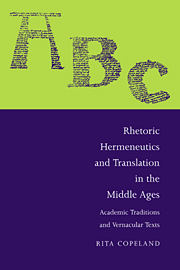Book contents
- Frontmatter
- Contents
- Acknowledgments
- List of abbreviations
- Introduction
- 1 Roman theories of translation: the fusion of grammar and rhetoric
- 2 From antiquity to the Middle Ages I: the place of translation and the value of hermeneutics
- 3 The rhetorical character of academic commentary
- 4 Translation and interlingual commentary: Notker of St. Gall and the Ovide moralisé
- 5 Translation and intralingual reception: French and English traditions of Boethius' Consolatio
- 6 From antiquity to the Middle Ages II: rhetorical invention as hermeneutical performance
- 7 Translation as rhetorical invention: Chaucer and Gower
- Afterword
- Notes
- Bibliography
- 1 Index of names and titles
- 2 General index
5 - Translation and intralingual reception: French and English traditions of Boethius' Consolatio
Published online by Cambridge University Press: 03 December 2009
- Frontmatter
- Contents
- Acknowledgments
- List of abbreviations
- Introduction
- 1 Roman theories of translation: the fusion of grammar and rhetoric
- 2 From antiquity to the Middle Ages I: the place of translation and the value of hermeneutics
- 3 The rhetorical character of academic commentary
- 4 Translation and interlingual commentary: Notker of St. Gall and the Ovide moralisé
- 5 Translation and intralingual reception: French and English traditions of Boethius' Consolatio
- 6 From antiquity to the Middle Ages II: rhetorical invention as hermeneutical performance
- 7 Translation as rhetorical invention: Chaucer and Gower
- Afterword
- Notes
- Bibliography
- 1 Index of names and titles
- 2 General index
Summary
Notker's work and the Ovide moralisé exemplify the two extremes of primary translation. These works also demonstrate how exercitatio defines itself through two models and two historical points of the interlingual transmission of texts. In both cases, the vernacular appropriation of academic discourse is part of the program of exercitatio. The Ovide moralisé takes this program to the furthest extent by using academic apparatuses to refer to itself, so that the translation being produced in the service of exposition has actually displaced the original text and its exegetical encrustations as the object of exposition. When we look between these two extremes of the continuum of primary translation, at texts that represent intermediate forms of primary translation, we see other ways for exercitatio to define itself. In this chapter I will consider how exercitatio can function in intralingual terms, within the same vernacular tradition or related vernacular cultures, where the translators not only contest the original text, but also build on and compete with earlier translations of the same text. This intralingual model of exercitatio anticipates the curious self-referentiality or self-sufficiency of the Ovide moralisé, where the vernacular translation becomes its own discursive subject.
To illustrate the intermediate range of primary translation in this chapter I have drawn from traditions of Boethius translation in French and Middle English. Medieval vernacular translations of the Consolatio have long been the subject of historical and critical investigation, and the last decade in particular has seen an efflorescence in the scholarly literature on these texts and their sources.
- Type
- Chapter
- Information
- Rhetoric, Hermeneutics, and Translation in the Middle AgesAcademic Traditions and Vernacular Texts, pp. 127 - 150Publisher: Cambridge University PressPrint publication year: 1991



